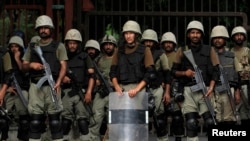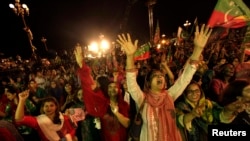Anti-government protesters outside Pakistan's parliament are showing no signs of leaving until Prime Minister Nawaz Sharif resigns, a demand the government rejects as unconstitutional. Meanwhile, the powerful military is warning all sides to resolve the political impasse through meaningful dialogue.
Thousands of anti-government protesters have been agitating in the center of the Pakistani capital for nearly a week in their bid to force Sharif from office.
Both the government and rally leaders are unwilling to back down, increasing fears of a violent confrontation between police and the crowd by the day.
Opposition politician Imran Khan and a populist religious leader, Tahir-ul-Qadri, have separately organized the mass protests. Though not officially allied, both are calling for the prime minister to step down.
Police did not intervene late Tuesday when protesters broke down barricades and forced their way into the high-security "Red Zone." The area houses the parliament and offices of the prime minister and president along with other key government buildings.
Unaddressed demands
Khan, who heads the third-largest political bloc in parliament, presented his list of demands in a speech to the rally Wednesday night. But he said Sharif's departure remains his top demand before any purposeful talks with government representatives are held.
Addressing the prime minister, the cricketer-turned politician said "Let me assure you that Imran Khan will not leave until you resign." He again alleged that Sharif came to power through "rigged" elections and demanded major reforms in the electoral system before new elections.
A government team contacted Khan's negotiators on Wednesday but analysts say hopes for a meaningful dialogue are not high.
The parliament met on Wednesday to debate the political crisis. Sharif was present in the house where his supporters criticized both Khan and Qadri. Even lawmakers from the main parliamentary opposition sided with the government to oppose the protesters.
Opposition member Shazia Marri in her speech said protests that threaten and undermine supremacy of the parliament in the name of democratic freedom of speech and movement cannot be condoned.
"You cannot have the license to abuse the constitution of Pakistan. You cannot be given the license to malign the parliament of Pakistan which comprises of elected representatives who are representing the people of Pakistan," said Marri.
Cleric Qadri is angry over the killings of more than a dozen of his followers in a police crackdown on a demonstration in Lahore this past June. He wants top provincial officials responsible for ordering the use of force to be brought to justice.
The religious leader reiterated his demands Wednesday while addressing his supporters in Islamabad. He complained that more than two months have passed but the government is not ready to address his concerns.
Qadri said "we are protesting here because the courts and police are not ready to give us justice." He added "not only the government has failed to detain those responsible for murdering his followers, it has ignored court orders to register a police case for initiating legal proceedings."
Army calls for dialogue
The anti-government demonstrations have shut down large parts of the capital for days, disrupting life and business activities. The government has deployed hundreds of troops and thousands of police and paramilitary forces to discourage violence.
In an unexpected reaction to the political tensions, Pakistan's powerful military Tuesday night called for a "meaningful dialogue" to resolve the crisis. In a brief statement, it warned that the situation requires "patience, wisdom and sagacity from the all stakeholders to end the prevailing impasse."
Army Chief General Raheel Sharif reportedly held another round of talks with government officials on Wednesday to urge them to negotiate with protesters.
Critics say the army's efforts appear to be aimed at distancing itself from the political turmoil and removing perceptions it is behind the anti-government campaign. The military has carried out three coups in Pakistan and is considered the most powerful player in domestic politics.





